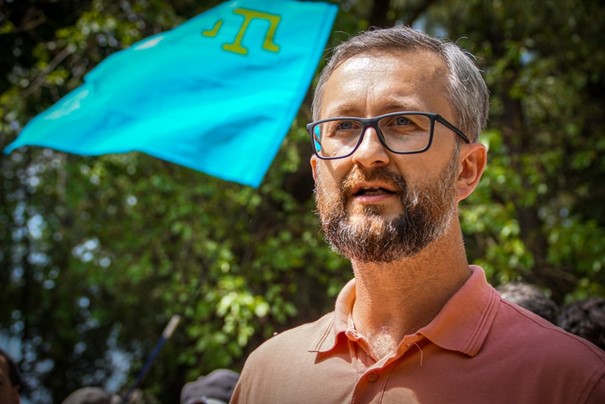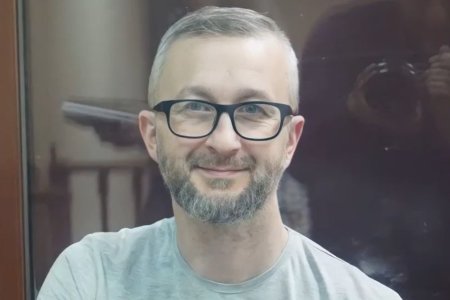
It was exactly ten years ago, on 26 February 2014, that at least ten thousand Crimean Tatars and other Ukrainians thwarted Moscow’s attempt to seize control of Crimea without openly deploying Russian forces. Although military preparations had long been underway, the Kremlin had used its agents to try to force through an illegal ‘vote’ in the Crimean parliament on changing Crimea’s status. The demonstration that day, called by the Mejlis, or representative assembly of the Crimean Tatar people, forced Moscow’s hand and doomed Mejlis leaders and the Crimean Tatar people to especially savage repression. It is, probably, true that such vengeance was guaranteed anyway since the Mejlis, and the Crimean Tatars it represents, spoiled Moscow’s narrative, by making it unequivocally clear that their Crimean homeland was Ukrainian. Kremlin dictator Vladimir Putin does not believe in concealing his grudges, and one of Russia’s most legally nihilistic show trials was over the demonstration on 26 February 2014. That same wish for revenge was seen seven years later, when Nariman Dzhelyal, world-renowned Crimean Tatar Mejlis leader and journalist, was seized on overtly absurd charges two weeks after he took part in the international Crimea Platform inauguration on the de-occupation of Crimea.
Nariman Dzhelyal (b. 27 April 1980) was the highest-ranking Mejlis leader after Russia illegally banned Mustafa Dzhemilev and Mejlis Chairperson Refat Chubarov from their homeland, and imprisoned Deputy Mejlis leader Akhtem Chiygoz over the 26 February demonstration* Both Dzhelyal and his wife, Leviza, had long lived with the awareness that his arrest could come any day, although neither had envisaged the grotesque charges that the Russian occupation regime would concoct. As Dzhelyal himself wrote:
“I was prepared for a charge of involvement in the activities of the ‘prohibited’ Mejlis of the Crimean Tatar people; of supporting Ukraine’s territorial integrity which the Russian regime views as calls against Russia’s territorial integrity. Or that they’d use the ‘popular’ legislative norms on extremism. However the foul insanity which the Kremlin had prepared for me, was staggering. The trip to the Crimea Platform was undoubtedly a ‘red line’. The Kremlin reacted savagely to the event and threatened to punish those who took part in it.”
The inaugural meeting of the international Crimea Platform took place in Kyiv on 23 August 2021. It was attended by European Union President Charles Michel and high-ranking representatives of 45 countries, including the USA, Canada and individual EU states. All the speakers, like Charles Michel, affirmed their non-recognition of Russia’s occupation of Ukrainian Crimea and their willingness to “stand tall against any violations of international law.” Among the Mejlis leaders present was Nariman Dzhelyal. Moscow reacted with angry bluster both to high-level international representation at a meeting discussing the de-occupation of Crimea, and with open repression in occupied Crimea.
Although Nariman Dzhelyal was the last of five Crimean Tatars to be ‘arrested’ two weeks later, it was clear to all that he was the real target. Five men were essentially abducted from early on 3 September 2021, to the morning of 4 September. abductions after armed raids. Civic journalist Asan Akhtemov (b. 1989) and his cousin, Aziz Akhtemov (b. 1996) were seized during the night from 3-4 September. Both were held incommunicado and prevented from seeing independent lawyers until the European Court of Human Rights [ECHR] intervened almost ten days later. The two men immediately retracted their ‘confessions’ and gave shocking accounts of the torture used to obtain this. As well as electric shocks and other physical torture, the FSB had also threatened reprisals against the men’s families.
Both Eldar Odamanov, who had disappeared after the armed search of his home earlier on 3 September, and Shevket Useinov, seized during the following night, were held incommunicado until 5 September. They were then jailed for 10 and 15 days on absurd charges, quite unrelated to the armed raids on their homes. As feared, the two latter men had been forced into ‘testifying’ against Dzhelyal and the Akhtemovs. During the men’s trial, however, both men described the illegal methods of duress that the FSB had used to obtain such ‘testimony’.
Absurd ‘sabotage’ pretext
There is no real evidence that an act of sabotage was committed on 23 August 2021, while Dzhelyal was in Kyiv. There appears to have been some minor damage to a gas pipe in Perevalne, with the initial criminal investigation launched being under Article 167 § 2 of Russia’s criminal code (‘deliberate destruction or damage to property’. There was no further mention of this damage, and to this day no photos, etc. have been made public. The gas pipe in question was not on any central circuit and could be fixed relatively easily, and painlessly, given that any disruption to gas supplies was in summer.
Despite all of the above, the FSB first seized five Crimean Tatars and then came up with the claim that there had been an act of ‘sabotage’ which had been planned by Ukraine’s Military Intelligence together with the Mejlis.
The indictment was based solely upon ‘testimony’ obtained while men were held incommunicado and without access to proper lawyers. Asan and Aziz Akhtemov both retracted their supposed ‘testimony’ as soon as they were able to speak with lawyers. The first of many increases to the charges came immediately after the Akhtemovs ignored an open threat from the FSB and retracted the ‘confessions’ obtained through torture. As well as confirmation in court from both Odamanov and Useinov, that they had been placed under duress, there had also previously been public statements from two Crimean Tatars who found the courage to refuse to collaborate with the FSB and provide false testimony.
There were also three ‘secret witnesses’, whose ‘testimony’ could not be verified. As in all such cases, no grounds were provided to justify anonymity, yet the ‘court’ not only allowed it, but also obstructed the defence from demonstrating the flaws in the supposed testimony (details here).
The men were all accused of carrying out an act of sabotage as part of an organized group (Article 281 § 2a), and of the illegal purchase, transfer or possession of explosives as part of an organized group (Article 222.1 § 4). On 8 November, an additional charge was added, of smuggling an explosive device, as part of an organized group (Article 226.1 § 1); and of ‘causing considerable material damage to the Crimean gas network (to the tune of around 1,425 USD). It was even claimed that the minor damage to an obscure gas pipe constituted “an attack on the Russian Federation’s defence capabilities”.
On 21 September 2022, ‘judges’ Viktor Ivanovich Zinkov; Aleksei Viktorovich Kozyrev and Sergei Nikolaevich Pogregniak from the Russian occupation ‘Crimean high court’ sentenced Nariman Dzhelyal to 17 years’ imprisonment; Asan Akhtemov – to 15 years; and Aziz Akhtemov to 13 years, with all in harsh-regime prison colonies. Steep fines were also imposed: 700 thousand roubles (around 9 thousand euros) in Nariman’s case, 500 thousand roubles against Asan and Aziz Akhtemov. The sentence against Dzhelyal was two years longer than that demanded by ‘prosecutor’ Roman Lobov.
All of these individuals, and the three court of appeal ‘judges’ - Yelena Urod (presiding); German Aleksandrov and Ilona Stohniy – who took just a day and a half to increase those sentences by imposing even harsher conditions, knew that they were taking part in an act of revenge and imprisoning innocent men.
Nariman, Asan and Aziz are now imprisoned in Russia, thousands of kilometres away from their wives, children and their homeland. Nariman was sent in November last year to the Minusinsk Prison. This is five and a half thousand kilometres from Crimea and, supposedly, for particularly ‘dangerous’ prisoners. In fact, the especially dangerous prisoners in most Russian penal institutions are being released to fight in Ukraine, while Russia increasingly persecutes its own citizens, as well as Crimean Tatars and other Ukrainians from occupied territory.
Please write to Nariman, Asan and Aziz! The letters need to be in Russian, written by hand and on ‘innocuous’ subjects. If this is a problem, even just the sample letter below, perhaps with a photo or picture, would be fine and would show the men – and Moscow – that they are not forgotten.
Help in publicizing this appalling act of political vengeance is vital and could help to bring the men home!
Sample letter
Привет,
Желаю Вам здоровья, мужества и терпения, надеюсь на скорое освобождение. Простите, что мало пишу – мне трудно писать по-русски, но мы все о Вас помним.
[Hi. I wish you good health, courage and patience and hope that you will soon be released. I’m sorry that this letter is short – it’s hard for me to write in Russian., but you are not forgotten. ]
Addresses
Nariman Dzhelyal
Dzhelyalov, Nariman Enverovich (b. 1980)
662606 Russian Federation, Krasnoyarsk region, Minusinsk, 114 Gorky St, Krasnoyarsk region prison
Asan Akhtemov
Akhtemov, Asan Islamovich (b. 1989)
600020 Russian Federation, Vladimir region, Prison No. 2, Vladimir, 67 Bolshaya Nizhegorodskaya St
Aziz Akhtemov
Akhtemov, Aziz Eskenderovich (b. 1996)
662606 Russian Federation, Krasnoyarsk region, Minusinsk, 114 Gorky St., Krasnoyarsk region prison
* Akhtem Chiygoz and Ilmi Umerov were released in October 2017, probably as part of an agreement brokered by Turkey who agreed to hand over to Russia two of the latter’s state-contracted killers (details here)


